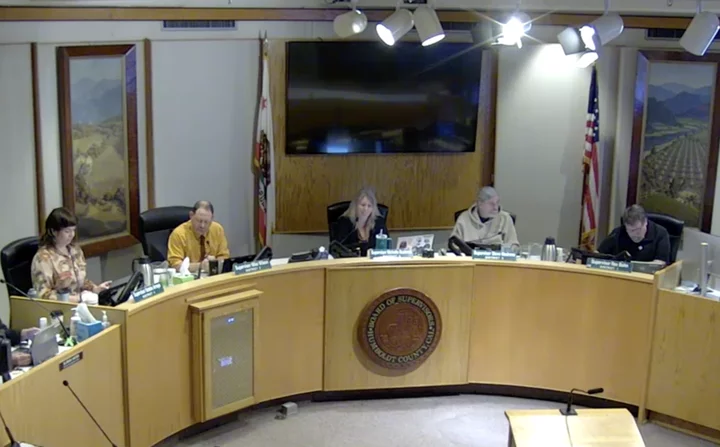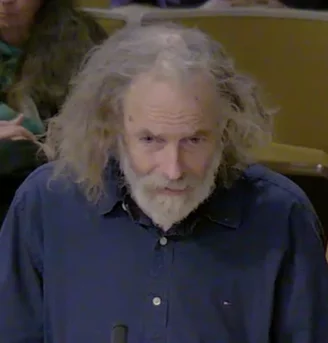The Humboldt County Board of Supervisors (from left): Natalie Arroyo, Mike Wilson, Michelle Bushnell, Steve Madrone and Rex Bohn. | Screenshot.
###
How do you solve a problem like Yee Haw?
For years now — and especially in recent months — county officials have been grappling with the ethical, legal and public health implications of the “intentional community” near Trinidad, where some two dozen low-income residents live in un-permitted makeshift dwellings replete with violations of county code — as is the 10-acre property on which they sit.
Back in September, the Board of Supervisors gave property owner Charles Garth 39 weeks (until late June of this year) to fix the code violations at 473 Quarry Road or else the county would proceed with tenant eviction and abatement measures, including environmental cleanup as well as demolition and removal of un-permitted structures.
At today’s meeting of county supervisors, staff with the Planning and Building Department reported that Garth and his tenants have made progress on addressing many of the public health concerns onsite, and Garth has submitted a petition that, if approved, could provide a pathway to making Yee Haw a fully permitted “Alternative Lodge Park.”
Granted, there’s a long way to go before that could happen, with perhaps $100,000 worth of technical studies and permitting fees required on top of property renovations to meet health and building codes and comply with the Americans with Disabilities Act, plus tens of thousands of dollars in unpaid fines.
Senior Planner Steve Lazar explained that while Garth applied for a general plan amendment and zone reclassification, staff believe the best path forward would instead be to amend the Tiny House Village provisions of the county’s zoning ordinance so this property could legally accommodate its multiple residences.
Lazar noted that two portable toilets and a hand-washing station have been installed on the property, as requested, and testing of the onsite water well revealed no bacteria.
“I think it’s safe to say that they’re acting in good faith to work towards compliance with these public health directives,” Lazar said, “but there remains work to be done.”
Garth was on hand to address the board, though he didn’t have much to say.
“This isn’t our first dance,” he said. “Me and the county have been doing this for quite a while. … You haven’t shut me down yet because we keep taking steps forward [and] you keep taking steps forward.”
He said he appreciates the work that county staff has done toward finding an alternative to eviction and abatement.
Fifth District Supervisor Steve Madrone has worked closely with Garth and the Yee Haw residents, and in public meetings he has been a staunch advocate for finding a way to accommodate the community, even if it requires bending or rewriting some rules.
But his fellow supervisors proved a bit more wary, especially First District Supervisor Rex Bohn and (today, at least) Third District Supervisor Mike Wilson.
Bohn said he worried that changing the zoning ordinance as requested — allowing emergency housing villages on land zoned for agriculture — could open the door to other developments of this kind all around the county. He also voiced skepticism about Garth’s ability and willingness to bring his property up to code by the deadline. Bohn also said that some of the junk vehicles that have been removed from Yee Haw were dumped in his district, near Loleta.
“So the problem didn’t go away; the problem got moved,” he said.
Madrone thanked staff for their work and said he’d be happy to change some rules.
“Does this open the door [for similar low-income communities]? Yeah, thank goodness, because we have a housing problem,” he said.
Madrone, who has a long history of advocating for composting privies, also suggested modifying the county’s waterless toilet ordinance. He failed to get traction with that request.
Wilson voiced concerns about “spot zoning” and the parcel’s access to public services such as sewer, water, public transit and fire protection.
Second District Supervisor Michelle Bushnell, whose one-year term as board chair began with today’s meeting, said she was worried about establishing a double standard. Garth’s petition asks the county to make an exception to its typical requirements for a Category Four road, and Bushnell noted that local weed growers have typically not been afforded such leeway.
During the public comment period, nearly all of the speakers voiced support for the Yee Haw community and the county’s efforts to accommodate it, though several of the speakers were residents.
When the supervisors resumed their deliberations, Wilson said he remains concerned about the long-term sustainability of this community given Garth’s track record and his status as a private landowner. He suggested possibly establishing a nonprofit so that residents could take advantage of grant funding.
Wilson also noted that changing the land use of the parcel from timberland to residential estates would significantly increase Garth’s property value while potentially opening the door to future subdivision of the property into four 2.5-acre estates with two residences apiece.
Eventually, despite these reservations, the board unanimously approved a motion to accept staff’s recommendation, thereby creating the path to legitimacy for Garth and his property. However, the motion, which was made by Madrone, included a provision to require Garth to pay close to $40,000 to reimburse county staff for its work on code enforcement at the property.
Airport hangar rent increase
Early in the meeting, during the public comment period for non-agenda items, several local pilots stepped to the lectern to voice concerns about recent airplane hangar rent increases at all county airports, a fee hike that some found galling given the sorry state of maintenance at the facilities.
One pilot said the rent increase forced the Northern Air Flight School/fixed-base operation (FBO) to close, though he and volunteers are working to revive it. Another complained that his hangar doors haven’t worked for years, and yet he was recently sent a bill for $2,000 in back rent.
“I feel like you guys are trying to kill general aviation,” pilot Dan Sayer said. “We’re not rich. We’re just trying to make it. We need a little service.”
Bushnell encouraged the pilots to send emails to the board, as that would make follow-up easier.
No paid holiday to mourn President Carter
Late in the meeting, prior to adjourning closed session to discuss legal matters, the board weighed whether or not to grant employees a paid day off to mourn the Dec. 29 death of former U.S. President Jimmy Carter.
Chair Bushnell, perhaps responding to some public side-eye about the proposal, took pains to note that it wasn’t her idea! She sponsored the agenda item as board chair but did not personally have a preference either way, she said.
County Administrative Officer Elishia Hayes said there’s some precedent for taking such a paid day of mourning: The county took one after former President George H.W. Bush died in 2018, for example. Plus, the current president called for this national day of mourning, she said.
“From my perspective, it’s either something that we do consistently or we don’t do at all, and I’m okay with making that decision today,” Supervisor Wilson said.
A couple of the supervisors noted that the county doesn’t exactly have money to burn at present, and the board ultimately decided not to give employees Thursday off with pay, though if they truly need that time to grieve they’ll be allowed to use some of their accrued paid time off, or take the day off without pay.


CLICK TO MANAGE